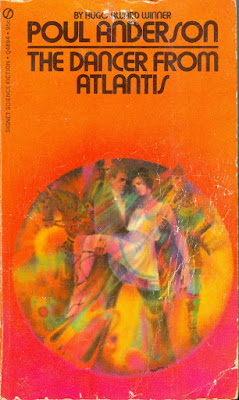I said in Catching Up that I would add an "approach to fiction" to the Science Fiction blog and another to the Logic of Time Travel blog. See:
The Very First Draft Of A Science Fiction Story
Mask
Manse Everard and Carl Farness are Time Patrolmen;
Jack Havig is a mutant time traveler;
everyone else mentioned below is an accidental time traveler.
Everard and Duncan Reid share a Midwestern upbringing.
Everard and Havig share a knowledge of the history of science. Both know that Galileo never said:
"'E pu si muove.'"
-Poul Anderson, The Shield Of Time (New York, 1991), 1987 A.D., p. 27;
-Poul Anderson, There Will Be Time (New York, 1973), V, p. 46.
Carl's Goths resist Huns whereas Hun Uldin attacks Goths, both in the fourth century A.D.
Oleg Vladimirovitch sees the "...sun-spilling sky..." (The Dancer From Atlantis, Chapter Two, p. 14) whereas Uldin sees "...huge hawk-haunted heaven..." (p. 15) and recalls the tribal camp on summer evenings -
sounds: creaking wagons, noise, laughter, crackling flames, talk, lays, songs;
smells: smoke, roasting meat etc;
tastes: gluttonous eating and kumiss, fermented mare's milk;
sight: whirling flames showing friends' faces among restless shadows;
sex: after getting drunk on kumiss.
Erissa asks her husband to pour a rhyton of Cyprian wine for her eldest son whose father was a god, Duncan. Kneeling, signing herself and praying at the household shrine, Erissa prefigures later visions and practices:
"Cradling Her Son in Her arms, Our Lady of the Ax seemed in the uncertain light to stand alive, stirring, as if Her niche were a window that opened upon enormous reaches." (p. 17)
Time travelers lead colorful lives even before they time travel.

3 comments:
Kaor, Paul!
The flat, open plains of eastern Europe and Ukraine has been what made it relatively easier for various tribe and nations to be conquered, or expelled and driven westwards when invaders pushed in from the east. And if, as we see happening in "The Sorrow of Odin the Goth," the Goths quarreled among themselves, internal disunion exposed then even more to attack from the east.
Sean
The odd thing is that the Volkerwanderung -- the mass invasion of the Roman Empire by Germanic peoples -- ended up drastically restricting the area of Germanic speech in eastern and central Europe.
The Huns were the proximate cause (and later the Bulgars, Avars and Magyars) but thne Slavs inherited an enormous territory that in say 350 CE had been inhabited, or at least ruled, by Germanics.
If the Huns hadn't broken the Goths in the Ukraine, probably the whole swath of Slavic-speaking territory in Europe would have ended up speaking East Germanic languages. As it was, the East Germanic tongues became extinct -- the last remnant of Gothic in the east (in the Crimea) died out in the 17th century.
Dear Mr. Stirling,
And the only bits of Gothic we still have is Ulfilas' Gothic Bible and a few legal texts. It does make me wonder what might have happened in real history if the Goths of King Ermanaric's time hadn't fallen into internal strife. We know JUST enough to think something like that is what happened. The rest, as they say, is history.
Sean
Post a Comment